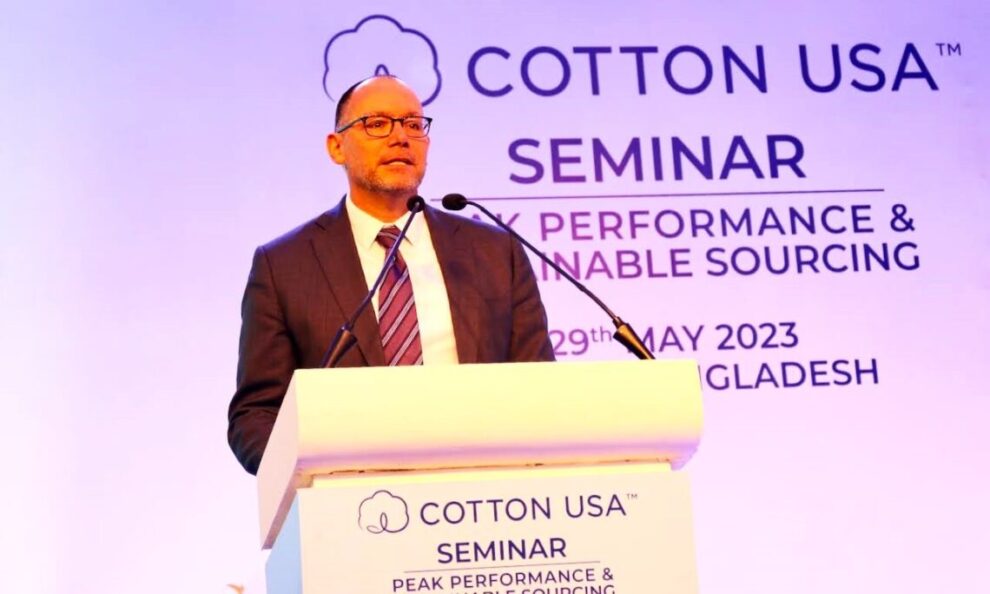Good morning, everyone.
It is a pleasure to be here today and to see so many of you again.
Over the past two years, I have stood in front of you, the cotton industry, on a few occasions, and have always spoken about the need to lift the fumigation on-arrival requirement for U.S. cotton.
I am happy to report that you will not hear the words “cotton fumigation” from me again, as our twenty-year effort has paid off.
Through substantial cooperation and collaboration with the Government of Bangladesh, led by the U.S. Department of Agriculture, and immense support from the cotton industry, Bangladesh conducted a risk assessment and concluded that U.S. growers, as of May 16, can now ship cotton to Bangladesh without any market access barriers.
For our American friends in the room, this is a major win that will unlock U.S. potential in this growing market.
As I am sure you are all aware, Bangladesh is the second largest global importer of cotton. It represents the seventh largest export market for U.S. cotton, exceeding $475 million in export value in 2022, and has one of the largest ready-made garment (RMG) export industries in the world.
For our Bangladeshi friends here today, this is also a huge win.
Previously, fumigation imposed a days-long delay in the delivery of U.S. cotton, with you, the Bangladeshi importers, picking up the tab, spending a million dollars annually.
Bottom line: U.S. cotton is the best in the world. It is high-quality and sustainable—and we have the data to prove it.
And now it is much easier for you to procure.
Working together with Bangladesh to solve this issue is a great example of how our two countries can collaborate to increase prosperity and remove trade barriers.
Bangladesh needs high-quality U.S. cotton to fuel its growth and increase its foreign exchange earnings, while American consumers rely on sustainable, high-quality garments produced in Bangladesh.
Bangladesh’s leadership in the global garment industry also comes with expectations and obligations.
These include not just sourcing high-quality and sustainably grown cotton and producing good quality products, but also ensuring good, safe working conditions where workers’ rights and dignity are respected.
Many of the brands in the room today can play a crucial role in using sustainably sourced cotton, pushing for fairer pricing, and improving labor rights, particularly on freedom of association and collective bargaining in the RMG sector.
Returning to sustainable cotton sourcing, I was happy to learn that many of you here today are members of the U.S. Cotton Trust Protocol.
I also hear that a new U.S. brand, American Eagle Outfitters, has just signed on. Congratulations!
Sustainability efforts, such as this one, set the United States apart from our competitors.
The Trust Protocol is the first program to provide both access to full supply chain transparency and science-based field-level, verified data.
The Trust Protocol also contains robust criteria for labor practices in the U.S. cotton industry.
Again, we are not only saying our cotton is sustainable, we are backing it up with data.
The actions we take to fight climate change will be the defining legacy of our generation. Reducing our environmental footprint is paramount.
I have been impressed by the many concrete steps that Bangladeshi companies have taken to improve sustainability throughout the RMG industry.
Circularity, LEED-certified factories, joining the Trust Protocol; this list goes on.
You are the industry leaders, and I encourage everyone here today to continue to innovate and promote best environmental and labor practices in Bangladesh and around the globe.
The United States has been a proud partner of Bangladesh since its independence. We are also your largest RMG customer.
We have a lot to celebrate in our relationship and look forward to continuing to work together over the next 50 years and beyond.
Thank you.
Source : Embassy





































